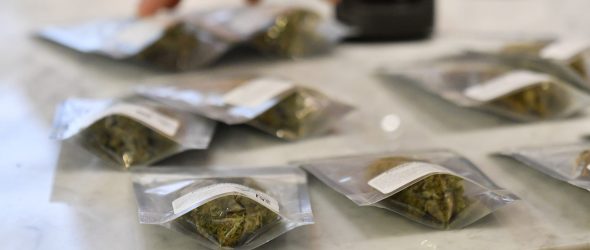 https://cannabisexaminers.com/wp-content/uploads/2020/03/b9872491-e5c6-4b86-a717-007d24c0e04d-2019-1201-rb-bu-recreational309-scaled.jpg
https://cannabisexaminers.com/wp-content/uploads/2020/03/b9872491-e5c6-4b86-a717-007d24c0e04d-2019-1201-rb-bu-recreational309-scaled.jpg
This Tuesday, the voters of Clinton Township will be faced with a defining ballot initiative — whether to stand with the 80% of Michigan communities that have said no to large-scale recreational marijuana businesses, or whether to become a central hub of the marijuana industry. There is no in-between because the marijuana industry has gone all-in.
Tuesday, the industry will put this intentionally misleading ballot language in front of voters: “This proposed ordinance would: Authorize and limit the type and number of marihuana establishments allowed in the township.”
Note that the language doesn’t state the type of establishments it would allow (it would allow every type), nor does it specify the number of establishments it would allow (which is 24). Worse, it tells voters it is “limiting” something when instead it is trying to take the number of marijuana facilities from zero to 24.
The initiative isn’t asking the voters to test out one or two of these controversial businesses to see how it goes. Instead, in one fell swoop, it is trying to set up 24 marijuana businesses in the township — nearly one per square mile. It isn’t asking voters to put these two dozen businesses in out-of-the-way industrial areas. It wants to put them on main roads, within sight of schools and homes.
More: Marijuana issue stirs controversy in Clinton Township amid upcoming election
The marijuana industry has poured an unprecedented amount of dark money — $620,000 at last count — into the election. All of the money is run through a cynically named nonprofit, “Citizens for Clinton Township,” which it formed to conceal who is behind this.
Proponents of the marijuana industry first tried to intimidate the township Board of Trustees into allowing this by threatening a ballot initiative. The board, which had studied the issue for two years and concluded that big marijuana facilities were not in the best interest of the township, stood up to them and voted no. So now proponents of the marijuana industry have pressed ahead with its threatened ballot initiative.
When a grassroots group of actual Clinton Township residents formed to oppose the ballot initiative, the industry tried to intimidate them, too, issuing press releases and filing multiple “campaign finance violation” complaints with the state — all of which were summarily dismissed. It sunk even lower by filing a complaint against St. Thecla School — for the “crime” of telling its families about the industry’s plans to put a marijuana dispensary within view of the school playground.
Consistent with its “deceive and pass” strategy, the marijuana industry is telling voters that this proposal is about protecting the right to use recreational marijuana. But that’s legal under state law and will remain legal regardless of the outcome of this initiative.
The industry has also been saying that the initiative will fix Clinton Township’s roads. But the township treasurer conducted a detailed study and concluded that marijuana taxes would bring “very little” money to the township.
The industry claims these large commercial facilities are safe and will not harm children. But our school leaders disagree. Every superintendent in Clinton Township opposes these facilities, and the Chippewa Valley and Clintondale school boards have passed unanimous resolutions asking the township not to allow them.
The people behind this ballot initiative have tried everything but telling voters the truth: That they are trying to enrich themselves at the public’s expense by making Clinton Township the marijuana capital of Macomb County.
Anthony J. Penna is a 40-year resident of the Clinton Township and the attorney for the group Clinton Township First which opposes the ballot initiative.
Read or Share this story: https://www.detroitnews.com/story/opinion/2020/03/09/opinion-dont-make-us-pot-capital-macomb-county/4974902002/

